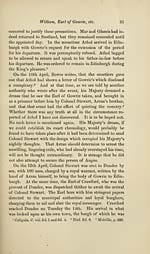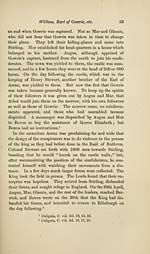Papers relating to William, first Earl of Gowrie, and Patrick Ruthven, his fifth and last surviving son
(38) Page 22
Download files
Complete book:
Individual page:
Thumbnail gallery: Grid view | List view

22 Observations on the Trial and Death of
the official head, does not seem to have excited any suspicion.
At three o'clock on the following morning, Wednesday the 15th
April, the vessel which bore Colonel Stewart hove in sight. It
was nine o'clock a.m., when they made the land. It is likely
that the vessel had attracted attention in the town, and that
some rumour which had got afloat respecting her drew Gowrie
to the harbour when she entered. Certain it is that he was
there, and that he saw Colonel Stewart, the brother of his
deadly foe, step forth upon the shore. He could scarcely
doubt what was the Colonel's errand. He retired hastily to
his lodgings, which were in the house of a burgher named
William Drummond. He summoned his servants, barricaded
the house, and set the Colonel at defiance. Had he been in
his own house at Perth, in the midst of his tenants and re-
tainers, and surrounded by a population to whom he was
known, and by whom he was beloved, it is likely that he might
have been able to resist a much larger force than Colonel
Stewart had to bring against him ; but the influence of the
Earl of Crawford secured the townsmen, and with their assist-
ance Colonel Stewart effected Gowrie's capture, after a defence,
some say of three hours, some of six, and some of twelve. On
the day following he was removed from Dundee. He passed
Friday the 17th, the day of the appointed meeting at Stirling,
on the road or at sea, and was brought into Edinburgh a pri-
soner on the day following. 1
The capture of Gowrie was the defeat of the plot. The
news that their chief was taken was carried to Perth. It was
circulated throughout the country with that peculiar speed
with which a rude people convey from one to another tidings
in which they have a common interest. When the 17th
arrived, not one of Gowrie's retainers stirred from home.
Even if actually apprised of the day, no one would dream of
keeping tryst, or taking the field, in the absence of his chief;
and those who were not Gowrie's men, but with whom he had
communicated, would conclude that the whole matter was at
1 Caligula, C. viii. fol. 9 and fol. 11. Moysie's Mem. p. 48.
the official head, does not seem to have excited any suspicion.
At three o'clock on the following morning, Wednesday the 15th
April, the vessel which bore Colonel Stewart hove in sight. It
was nine o'clock a.m., when they made the land. It is likely
that the vessel had attracted attention in the town, and that
some rumour which had got afloat respecting her drew Gowrie
to the harbour when she entered. Certain it is that he was
there, and that he saw Colonel Stewart, the brother of his
deadly foe, step forth upon the shore. He could scarcely
doubt what was the Colonel's errand. He retired hastily to
his lodgings, which were in the house of a burgher named
William Drummond. He summoned his servants, barricaded
the house, and set the Colonel at defiance. Had he been in
his own house at Perth, in the midst of his tenants and re-
tainers, and surrounded by a population to whom he was
known, and by whom he was beloved, it is likely that he might
have been able to resist a much larger force than Colonel
Stewart had to bring against him ; but the influence of the
Earl of Crawford secured the townsmen, and with their assist-
ance Colonel Stewart effected Gowrie's capture, after a defence,
some say of three hours, some of six, and some of twelve. On
the day following he was removed from Dundee. He passed
Friday the 17th, the day of the appointed meeting at Stirling,
on the road or at sea, and was brought into Edinburgh a pri-
soner on the day following. 1
The capture of Gowrie was the defeat of the plot. The
news that their chief was taken was carried to Perth. It was
circulated throughout the country with that peculiar speed
with which a rude people convey from one to another tidings
in which they have a common interest. When the 17th
arrived, not one of Gowrie's retainers stirred from home.
Even if actually apprised of the day, no one would dream of
keeping tryst, or taking the field, in the absence of his chief;
and those who were not Gowrie's men, but with whom he had
communicated, would conclude that the whole matter was at
1 Caligula, C. viii. fol. 9 and fol. 11. Moysie's Mem. p. 48.
Set display mode to:
![]() Universal Viewer |
Universal Viewer | ![]() Mirador |
Large image | Transcription
Mirador |
Large image | Transcription
Images and transcriptions on this page, including medium image downloads, may be used under the Creative Commons Attribution 4.0 International Licence unless otherwise stated. ![]()
| Histories of Scottish families > Papers relating to William, first Earl of Gowrie, and Patrick Ruthven, his fifth and last surviving son > (38) Page 22 |
|---|
| Permanent URL | https://digital.nls.uk/94862174 |
|---|
| Description | A selection of almost 400 printed items relating to the history of Scottish families, mostly dating from the 19th and early 20th centuries. Includes memoirs, genealogies and clan histories, with a few produced by emigrant families. The earliest family history goes back to AD 916. |
|---|

